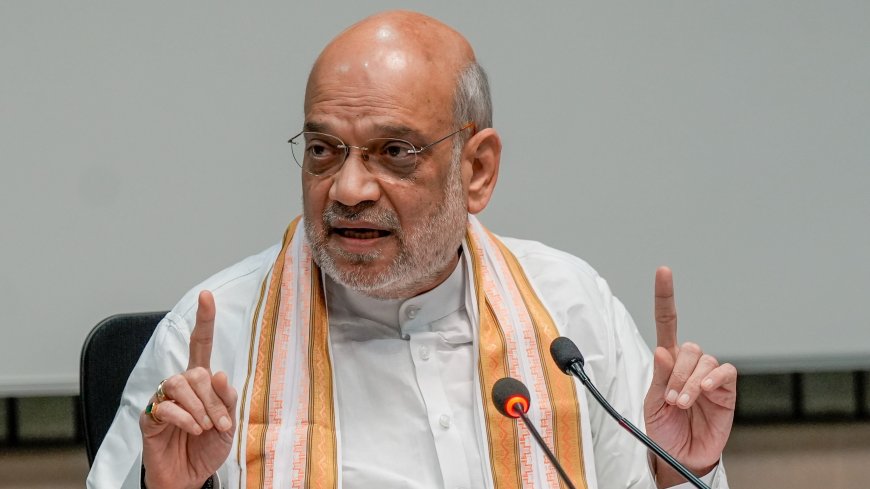Amit Shah Reasserts Kashmir’s Constitutional Bond with India on Mookerjee’s Birth Anniversary
On Syama Prasad Mookerjee’s birth anniversary, Amit Shah reiterated Kashmir’s full integration into India, crediting Mookerjee’s vision for the move. Read the political and historical significance behind this statement.

New Delhi, July 6, 2025 — Union Home Minister Amit Shah has once again drawn a sharp line of continuity between the vision of Syama Prasad Mookerjee, the founder of the Bharatiya Jana Sangh, and the integration of Jammu and Kashmir with India. Speaking on the occasion of Mookerjee’s birth anniversary, Shah credited him with shaping the ideological foundation that continues to guide India’s approach to Kashmir.
The remarks, made during a high-profile event in Delhi attended by senior Bharatiya Janata Party (BJP) leaders, RSS functionaries, scholars, and party workers, come at a time of renewed political and developmental focus on Jammu and Kashmir, particularly in the aftermath of Article 370's abrogation in 2019.
Mookerjee’s Legacy: A Contested but Enduring Influence
Syama Prasad Mookerjee, who passed away under mysterious circumstances in 1953, is remembered by many in nationalist circles as a martyr for the cause of Kashmir’s complete integration. He famously coined the slogan, "Ek desh mein do vidhan, do pradhan, aur do nishan nahi chalenge" (One country can’t have two constitutions, two prime ministers, and two flags).
Amit Shah referenced this quote in his speech, noting:
“It was because of Mookerjee's determination and sacrifice that today, under the leadership of Prime Minister Narendra Modi, Jammu and Kashmir has been fully integrated into the Indian Union.”
Reaffirming the Nationalist Narrative
Amit Shah’s speech served not only to honour Mookerjee but also to reaffirm the BJP’s ideological positioning on Kashmir. The Home Minister highlighted that:
-
Article 370, which granted special status to J&K, was always meant to be temporary.
-
The 2019 abrogation was not just a political move but a moral and constitutional correction.
-
The region is now seeing development, infrastructure growth, and new political participation, particularly in the form of recent local body elections.
Shah underlined that Mookerjee's fight was not in vain, and that the government’s actions since 2014 have been deeply aligned with his vision for national unity and integration.
Political Significance of Shah’s Timing
The timing of Shah’s statement is crucial. It comes as Jammu and Kashmir gears up for legislative elections, expected later this year. While the security situation in the region has improved in many areas, recent skirmishes and militant incidents have kept Kashmir in national focus.
Shah’s words were aimed not just at remembering a historical figure but at galvanizing nationalist sentiment ahead of elections, reinforcing the BJP’s narrative that only it had the courage and vision to resolve the Kashmir question.
Opposition's View: A Selective Reading of History?
Opposition parties, particularly the Congress and People's Democratic Party (PDP), criticized Shah’s remarks, accusing the BJP of appropriating Mookerjee’s legacy for electoral gains. PDP spokesperson Waheed Para stated:
“The people of Kashmir want development and dignity, not just historical references. This selective reading of history doesn't address current grievances.”
Congress leaders questioned why, despite abrogating Article 370, the political process in Kashmir remains largely suspended, and the region continues to be governed under Lieutenant Governor's rule.
Ground Realities in Jammu & Kashmir: Post-370 Developments
Since the revocation of Article 370 in August 2019, the government has claimed significant strides in:
-
Development Projects: Roads, tunnels, and smart city projects in Srinagar and Jammu.
-
Investment Push: Over ₹75,000 crore in investment proposals received post-370.
-
Tourism Growth: 2024 saw a record number of tourist arrivals in the Kashmir Valley.
-
Security Reforms: Targeted operations have reduced insurgent activity in several districts.
However, critics argue that internet shutdowns, arbitrary detentions, and curbs on press freedom continue to cast a shadow over these claims.
Kashmir in National Discourse: A Permanent Fixture
The issue of Kashmir remains central to Indian political discourse, particularly in the BJP’s nation-building narrative. The mention of Syama Prasad Mookerjee at a time when Kashmir is undergoing political restructuring serves as a reminder that for the BJP, Kashmir is not just a geographical entity but a symbol of ideological resolve.
Shah’s comments also resonated deeply with party cadre, many of whom see the Kashmir integration issue as unfinished historical business that the Modi government has finally addressed.
Conclusion
Amit Shah’s speech marking Syama Prasad Mookerjee’s birth anniversary was more than a tribute—it was a strategic political assertion that links historical ideology with contemporary governance. As the Home Minister continues to shape the BJP’s security and national unity agenda, his reaffirmation of Kashmir’s place in India is a clear signal that the party sees its actions post-2019 as both irreversible and righteous.
The political future of Kashmir may still be evolving, but in the BJP’s national vision, it is a completed chapter in India’s constitutional history—one that began with Mookerjee and has now, in Shah’s view, come full circle.














